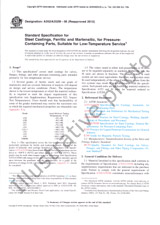We need your consent to use the individual data so that you can see information about your interests, among other things. Click "OK" to give your consent.
ASTM D1193-06(2018)
Standard Specification for Reagent Water
Translate name
STANDARD published on 15.3.2018
The information about the standard:
Designation standards: ASTM D1193-06(2018)
Note: WITHDRAWN
Publication date standards: 15.3.2018
SKU: NS-810386
The number of pages: 6
Approximate weight : 18 g (0.04 lbs)
Country: American technical standard
Category: Technical standards ASTM
The category - similar standards:
Annotation of standard text ASTM D1193-06(2018) :
Keywords:
laboratory analysis, reagent, water,, ICS Number Code 71.040.30 (Chemical reagents)
Additional information
| 1. Scope | ||||||||||||||||||||||||||||||
|
1.1 This specification describes the required characteristics of waters deemed suitable for use with the standards under the jurisdiction of ASTM. 1.2 The alphanumeric characters ascribed to water types and grades are specified in the manual, Form and Style for ASTM Standards. These have been assigned in order of historical precedence and should not be taken as an indication of a progression in water purity. 1.3 Four types of waters have been specified, with three additional grades that can be applied to the four types. The grade specifications specifically address contaminants of microbiological origin. 1.4 All applicable ASTM Standards are expected to reference one or more of these reagent water types where reagent water is needed as a component of an analytical measurement process. Where a different water type or grade is needed for an ASTM Standard, it may be added to this Specification through the ASTM Standard revision process. 1.5 Although these water types and associated grades have been defined specifically for use with ASTM Standards, they may be appropriate for other applications. It is the responsibility of the users of this specification to ensure that the selected water types or grades are suitable for their intended use. Historically, reagent water Types I, II, III, and IV have been linked to specific processes for their production. Starting with this revision, these types of waters may be produced with alternate technologies as long as the appropriate constituent specifications are met and that water so produced has been shown to be appropriate for the application where the use of such water is specified. Therefore, the selection of an alternate technology in place of the technology specified in Table 1 should be made taking into account the potential impact of other contaminants such as microorganism and pyrogens. Such contaminants were not necessarily considered by the performance characteristics of the technology previously specified. 1.6 Guidance for applications, the
preparation, use and monitoring, storage, handling, distribution,
testing of these specified waters and validation of the water
purification system is provided in Appendix X1 of this specification.
1.7 The values stated in SI units are to be regarded as standard. No other units of measurement are included in this standard. 1.8 This standard does not purport to address all of the safety concerns, if any, associated with its use. It is the responsibility of the user of this standard to establish appropriate safety, health, and environmental practices and determine the applicability of regulatory limitations prior to use. 1.9 This international standard was developed in accordance with internationally recognized principles on standardization established in the Decision on Principles for the Development of International Standards, Guides and Recommendations issued by the World Trade Organization Technical Barriers to Trade (TBT) Committee. |
||||||||||||||||||||||||||||||
| 2. Referenced Documents | ||||||||||||||||||||||||||||||
|
We recommend:
Technical standards updating
Do you want to make sure you use only the valid technical standards?
We can offer you a solution which will provide you a monthly overview concerning the updating of standards which you use.
Would you like to know more? Look at this page.




 Cookies
Cookies
